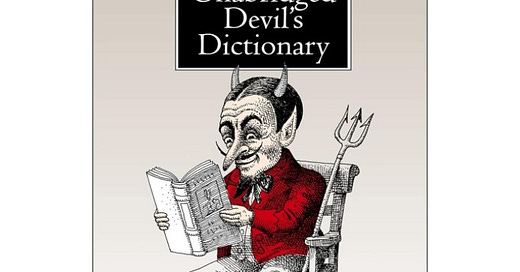Thanks to subscriber and friend,
, who writes Closing the Loop, I’ve been having a great time reading The Devil’s Dictionary by Ambrose Bierce. It is in the public domain, and I offer here just a few definitions which tickled my timbers. At some point, I’ll pick up where I left off, and finish the alphabet.Enjoy!
Kate
CORPORATION, n. An ingenious device for obtaining individual profit without individual responsibility.
DICTIONARY, n. A malevolent literary device for cramping the growth of a language and making it hard and inelastic. This dictionary, however, is a most useful work.
DOG, n. A kind of additional or subsidiary Deity designed to catch the overflow and surplus of the world's worship…He toils not, neither does he spin, yet Solomon in all his glory never lay upon a door-mat all day long, sun-soaked and fly-fed and fat, while his master worked for the means wherewith to purchase the idle wag of the Solomonic tail, seasoned with a look of tolerant recognition.
DRAMATIST, n. One who adapts plays from the French.
EDUCATION, n. That which discloses to the wise and disguises from the foolish their lack of understanding.
ENOUGH, pro. All there is in the world if you like it.
EXPERIENCE, n. The wisdom that enables us to recognize as an undesirable old acquaintance the folly that we have already embraced.
HABIT, n. A shackle for the free.
INFLUENCE, n. In politics, a visionary quo given in exchange for a substantial quid.
LAWFUL, adj. Compatible with the will of a judge having jurisdiction.
LEARNING, n. The kind of ignorance distinguishing the studious.
LEXICOGRAPHER, n. A pestilent fellow who, under the pretense of recording some particular stage in the development of a language, does what he can to arrest its growth, stiffen its flexibility and mechanize its methods. For your lexicographer, having written his dictionary, comes to be considered "as one having authority," whereas his function is only to make a record, not to give a law. The natural servility of the human understanding having invested him with judicial power, surrenders its right of reason and submits itself to a chronicle as if it were a statute. Let the dictionary (for example) mark a good word as "obsolete" or "obsolescent" and few men thereafter venture to use it, whatever their need of it and however desirable its restoration to favor—whereby the process of impoverishment is accelerated and speech decays. On the contrary, the bold and discerning writer who, recognizing the truth that language must grow by innovation if it grow at all, makes new words and uses the old in an unfamiliar sense, has no following and is tartly reminded that "it isn't in the dictionary" —although down to the time of the first lexicographer (Heaven forgive him!) no author ever had used a word that was in the dictionary. In the golden prime and high noon of English speech; when from the lips of the great Elizabethans fell words that made their own meaning and carried it in their very sound; when a Shakespeare and a Bacon were possible, and the language now rapidly perishing at one end and slowly renewed at the other was in vigorous growth and hardy preservation—sweeter than honey and stronger than a lion—the lexicographer was a person unknown, the dictionary a creation which his Creator had not created him to create.
LITIGANT, n. A person about to give up his skin for the hope of retaining his bones.
LITIGATION, n. A machine which you go into as a pig and come out of as a sausage.
Thank you for browsing at the Verbihund Café!
Ways to support the love of language; each one is appreciated!
restack this post
send to a friend
share on social media
send to others who love words and language!





All of these are witty, but the last two are my favorites. I'll have to remember them!
Thanks for the plug, Kate!
Reading the definition of a Lexiconographer leads me to ponder how such a person, and Bierce in particular, would regard the word Scrabble, a word appearing in my dictionary only in reference to itself. Somewhere, Gödel is smiling.